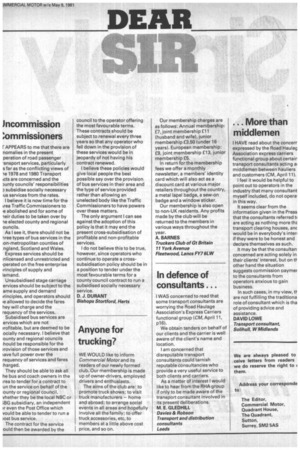)ncommission :ommissioners
Page 31

If you've noticed an error in this article please click here to report it so we can fix it.
I" APPEARS to me that there are nomalies in the present peration of road passenger -ansport services, particularly s far as the conflicting views of le 1978 and 1980 Transport cts are concerned and the )unty councils' responsibilities D subsidise socially necessary us services from the rates. I believe it is now time for the krea Traffic Commissioners to le abolished and for some of ieir duties to be taken over by le elected county and regional ouncils.
As I see it, there should not be iree types of bus services in the on-metropolitan counties of ngland, Scotland and Wales. Express services should be Inlicensed and unrestricted and ■ perated on the free enterprise irinciples of supply and lem and.
Unsubsidised stage carriage ervices should be subject to the ame supply and demand irinciples, and operators should re allowed to decide the fares hey will charge and the requency of the services. Subsidised bus services are ervices which are not irofitable, but are deemed to be ocially necessary. I believe that ounty and regional councils hould be responsible for the irovision of those services and lave full power over the requency of services and fares :11 arged.
They should be able to ask all he bus and coach owners in the irea to tender for a contract to un the service on behalf of the .ounty or regional council, vhether they be the local NBC or iBG subsidiary, an independent ir even the Post Office which you'd be able to tender to run a iost bus service.
The contract for the service ould then be awarded by the council to the operator offering the most favourable terms. These contracts should be subject to renewal every three years so that any operator who fell down in the provision of these services would be in jeopardy of not having his contract renewed.
I believe these policies would give local people the best possible say over the provision of bus services in their area and the type of service provided rather than allowing an unelected body like the Traffic Commissioners to have powers over these matters.
The only argument I can see against the adoption of this policy is that it may end the present cross-subsidisation of profitable and non-profitable services.
I do not believe this to be true, however, since operators who continue to operate a crosssubsidisation policy should be in a position to tender under the most favourable terms for a county council contract to run a subsidised socially necessary service.
D. J. DURANT
Bishops Stortford, Herts.
































































































































































